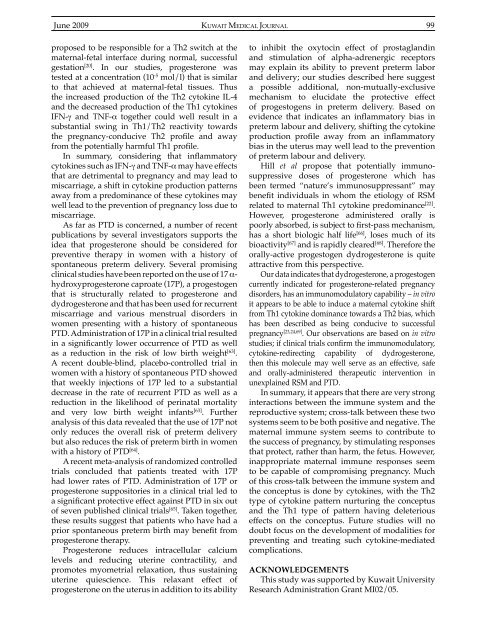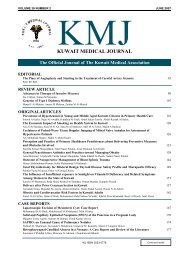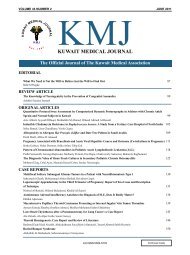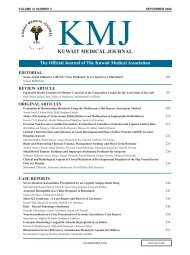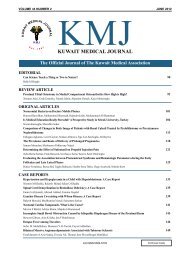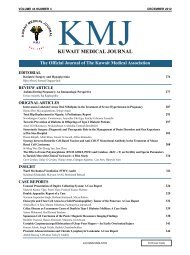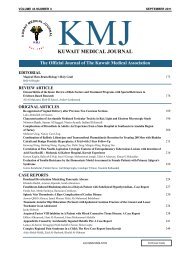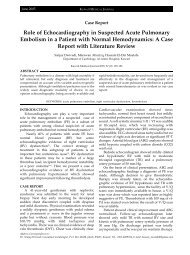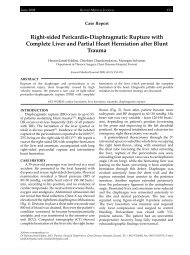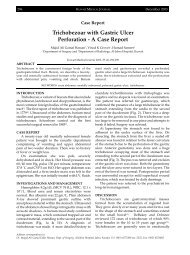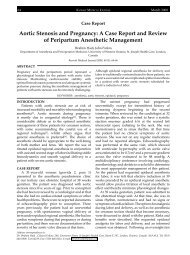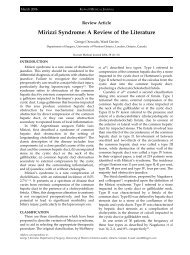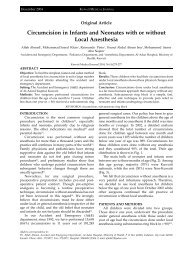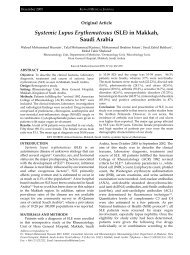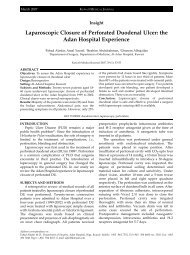June 09-41-2.indd - Kma.org.kw
June 09-41-2.indd - Kma.org.kw
June 09-41-2.indd - Kma.org.kw
You also want an ePaper? Increase the reach of your titles
YUMPU automatically turns print PDFs into web optimized ePapers that Google loves.
<strong>June</strong> 20<strong>09</strong>KUWAIT MEDICAL JOURNAL 99proposed to be responsible for a Th2 switch at thematernal-fetal interface during normal, successfulgestation [20] . In our studies, progesterone wastested at a concentration (10 -5 mol/l) that is similarto that achieved at maternal-fetal tissues. Thusthe increased production of the Th2 cytokine IL-4and the decreased production of the Th1 cytokinesIFN-γ and TNF-α together could well result in asubstantial swing in Th1/Th2 reactivity towardsthe pregnancy-conducive Th2 profile and awayfrom the potentially harmful Th1 profile.In summary, considering that inflammatorycytokines such as IFN-γ and TNF-α may have effectsthat are detrimental to pregnancy and may lead tomiscarriage, a shift in cytokine production patternsaway from a predominance of these cytokines maywell lead to the prevention of pregnancy loss due tomiscarriage.As far as PTD is concerned, a number of recentpublications by several investigators supports theidea that progesterone should be considered forpreventive therapy in women with a history ofspontaneous preterm delivery. Several promisingclinical studies have been reported on the use of 17 α-hydroxyprogesterone caproate (17P), a progestogenthat is structurally related to progesterone anddydrogesterone and that has been used for recurrentmiscarriage and various menstrual disorders inwomen presenting with a history of spontaneousPTD. Administration of 17P in a clinical trial resultedin a significantly lower occurrence of PTD as wellas a reduction in the risk of low birth weight [63] .A recent double-blind, placebo-controlled trial inwomen with a history of spontaneous PTD showedthat weekly injections of 17P led to a substantialdecrease in the rate of recurrent PTD as well as areduction in the likelihood of perinatal mortalityand very low birth weight infants [63] . Furtheranalysis of this data revealed that the use of 17P notonly reduces the overall risk of preterm deliverybut also reduces the risk of preterm birth in womenwith a history of PTD [64] .A recent meta-analysis of randomized controlledtrials concluded that patients treated with 17Phad lower rates of PTD. Administration of 17P orprogesterone suppositories in a clinical trial led toa significant protective effect against PTD in six outof seven published clinical trials [65] . Taken together,these results suggest that patients who have had aprior spontaneous preterm birth may benefit fromprogesterone therapy.Progesterone reduces intracellular calciumlevels and reducing uterine contractility, andpromotes myometrial relaxation, thus sustaininguterine quiescience. This relaxant effect ofprogesterone on the uterus in addition to its abilityto inhibit the oxytocin effect of prostaglandinand stimulation of alpha-adrenergic receptorsmay explain its ability to prevent preterm laborand delivery; our studies described here suggesta possible additional, non-mutually-exclusivemechanism to elucidate the protective effectof progestogens in preterm delivery. Based onevidence that indicates an inflammatory bias inpreterm labour and delivery, shifting the cytokineproduction profile away from an inflammatorybias in the uterus may well lead to the preventionof preterm labour and delivery.Hill et al propose that potentially immunosuppressivedoses of progesterone which hasbeen termed “nature’s immunosuppressant” maybenefit individuals in whom the etiology of RSMrelated to maternal Th1 cytokine predominance [22] .However, progesterone administered orally ispoorly absorbed, is subject to first-pass mechanism,has a short biologic half life [66] , loses much of itsbioactivity [67] and is rapidly cleared [68] . Therefore theorally-active progestogen dydrogesterone is quiteattractive from this perspective.Our data indicates that dydrogesterone, a progestogencurrently indicated for progesterone-related pregnancydisorders, has an immunomodulatory capability – in vitroit appears to be able to induce a maternal cytokine shiftfrom Th1 cytokine dominance towards a Th2 bias, whichhas been described as being conducive to successfulpregnancy [23,24,69] . Our observations are based on in vitrostudies; if clinical trials confirm the immunomodulatory,cytokine-redirecting capability of dydrogesterone,then this molecule may well serve as an effective, safeand orally-administered therapeutic intervention inunexplained RSM and PTD.In summary, it appears that there are very stronginteractions between the immune system and thereproductive system; cross-talk between these twosystems seem to be both positive and negative. Thematernal immune system seems to contribute tothe success of pregnancy, by stimulating responsesthat protect, rather than harm, the fetus. However,inappropriate maternal immune responses seemto be capable of compromising pregnancy. Muchof this cross-talk between the immune system andthe conceptus is done by cytokines, with the Th2type of cytokine pattern nurturing the conceptusand the Th1 type of pattern having deleteriouseffects on the conceptus. Future studies will nodoubt focus on the development of modalities forpreventing and treating such cytokine-mediatedcomplications.ACKNOWLEDGEMENTSThis study was supported by Kuwait UniversityResearch Administration Grant MI02/05.


